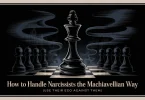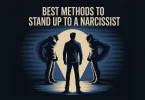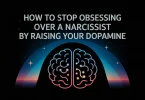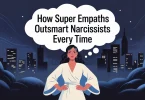The end of a narcissist’s life can bring up a whirlwind of emotions for those who have suffered at their hands. It may not be the grief we commonly expect when someone passes away, and understanding these feelings is key to finding peace. This article explores the complex dynamics that unfold when a narcissist dies, how their victims cope, and what closure looks like in these difficult situations.
Do Narcissists Change Before Death?
One of the most common questions people ask is whether narcissists become kinder or remorseful near the end of their lives. Do they soften with age? Do they ever apologize? For many, the hope that a narcissist might express regret or offer some form of closure lingers. But the reality is often far more disappointing.
Narcissists rarely, if ever, experience the kind of personal transformation that leads to meaningful change. Instead, they tend to double down on their self-centered behavior, even in their final moments. Apologies or moments of vulnerability are scarce. For those expecting reconciliation or a heartfelt goodbye, the end of a narcissist’s life often brings a hollow sense of loss, not just for the person they were, but for the person they never became.
Living in Fear and Going No-Contact
For many victims of narcissistic abuse, going no-contact is a survival mechanism. When someone is threatened, manipulated, and emotionally harmed over time, cutting ties becomes the only way to reclaim personal safety. For example, my own experience with my narcissistic father involved threats that forced me into hiding. After 12 years of no contact, I often wondered how I would feel when he passed.
No contact is not a decision made lightly. It’s a series of choices over time—moments where you choose not to engage, protect your boundaries, and prioritize your well-being. It means missing family events, birthdays, funerals, and countless other moments that go unwitnessed. These bricks of separation, laid one by one, create an emotional fortress that keeps the abuser at bay but also isolates the victim.
When You Don’t Get the Call
In many cases, when a narcissist dies, those who have gone no contact may not even be informed. This was my experience my siblings, who had my contact information, chose not to tell me when my father was dying. Instead, I received a text a day after his death. There was no opportunity to say goodbye, no moment of closure at his bedside. And when I tried to reach out, my calls were ignored.
This kind of betrayal adds another layer of hurt. It’s not just the narcissist who wounds you, but those around them family members who enable their behavior or choose loyalty to the abuser over their sibling.
Read More:
5 Tell Tale Signs Of Narcissistic Collapse
The Loneliness of Relief
When a narcissist dies, the initial feeling can often be one of relief. In my case, I wasn’t sad, I wasn’t angry I simply felt a sense of finality. The looming threat was over. But this relief comes with complications. You can’t tell people that you’re relieved your parent has died. You can’t explain that the lack of sadness is because of years of hiding and protecting yourself from someone violent and toxic.
This unspoken truth creates an isolating experience. To most people, you may seem callous or unfeeling, and that can be incredibly lonely. It’s a new form of ostracism—being cast aside for feelings that others can’t understand unless they’ve lived through similar trauma.
Read More:
4 Ways To Manipulate a Narcissist and Shut Them Down
How a Narcissist Destroys Your Body?
The Hollow Ache of Betrayal
In the days following my father’s death, the initial relief was quickly replaced by an aching sense of betrayal. The brief hope I had that in death, something might change was dashed. There were no words of apology, no gesture of reconciliation. Instead, I was explicitly written out of his will, as if his manipulation and cruelty reached beyond the grave.
It wasn’t just his betrayal I felt it was the betrayal of my siblings, who chose to continue enabling his behavior until the end.
The Harsh Reality of No Contact
People often think that going no-contact is a decision made in a single moment, but it’s not. It’s a process built brick by brick over the years. It’s the decision to miss out on family milestones, to stay silent when others reach out, and to protect yourself from someone who only brings pain. It’s the hard reality of severing ties not just with the narcissist, but with family and shared history.
No contact means carrying the weight of emotional isolation, knowing that your experiences and pain aren’t acknowledged by the family you’ve distanced yourself from. It’s a form of grief for the life you might have had if things were different.
The Final Blow: Posthumous Betrayal
In death, narcissists may leave behind a final act of cruelty. For me, it was discovered that my father had written me out of my grandparents’ trust, intentionally denying me any inheritance. It wasn’t about the money it was about the message: even in death, he wanted to hurt me. He even misspelled my name in the legal documents.
This act reinforced the harsh truth that some narcissists never let go of their need to control and punish. Even after they’re gone, their manipulations linger.
Read More:
Top 10 Things That Make the Covert Narcissist Panic
7 Things Narcissists Do When They Feel Unobserved
10 Things A Narcissist Will Never Do
Conclusion:
As brutal as the experience has been, my decision to go no-contact was undeniably validated. No matter how painful it was to cut ties with my family and my past, I now know without a doubt that it was the right choice for me and my daughter.
When a narcissist dies, it’s not the end of the pain, but it can be the beginning of a different kind of peace. It is a time to reflect on the boundaries you’ve built and to recognize that those walls, built brick by brick, were necessary to protect yourself. In the ruins left behind, there is both sadness and beauty a testament to your resilience in the face of emotional devastation.
If you are going through something similar, I offer my sincerest condolences. Know that your story matters, and sharing it can help others find strength and understanding in their journey.
Read More: What are the mental illnesses you get from narcissists?
Sharing Is Caring!






